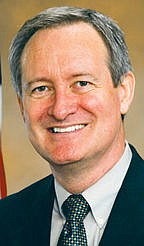Ensuring access to quality health care for rural Idahoans
More than a quarter of Idahoans and over 46 million Americans nationwide live in our vibrant rural communities. However, living in such remote areas has made it far too difficult for far too many Americans to access reliable, high-quality health care.
In May of this year, the Senate Finance Committee, which has jurisdiction over federal health programs, including Medicare and Medicaid, held a hearing to identify the hurdles and barriers facing rural providers. The panel of expert witnesses shared invaluable insight into what challenges our communities face daily, from staffing shortages to expanding financing options for regional hospitals. As the Committee’s lead Republican, I value the opportunity to hear insights from those in the field to help guide how we as legislators can address these challenges.
With provisions such as telehealth flexibilities and financial support for hospitals and ambulance providers set to expire, the hearing came at a critical time for the survival of these programs that so many Idahoans rely upon. For instance, in 2022, nearly one-third of all Medicare beneficiaries relied on telehealth services. For rural areas, where clinician shortages persist, cutting off this lifeline is not an option. And while telehealth can bridge access gaps, particularly for specialty and mental health services, we must also maintain and expand in-person options in rural communities.
To achieve that aim, there needs to be an adequately staffed, well-resourced, well-trained workforce to offer those services. As evidence shows, health care professionals who train in rural areas are more likely to remain there to practice. Expanding training options for rural health care professionals will expand their skills base and offer families in our communities reliable, world-class care.
Contributing to this challenge, frontline providers often face substantial financial strain, driven by factors far beyond their control. Rural hospitals are not only essential for serving patients, but are also critical to local economies, employing hundreds of individuals and supporting regional business development. Unfortunately, since 2005, more than 105 rural hospitals have closed, with numerous others at constant risk of closure.
Medicare’s existing strategies to preserve access to health care in rural areas often rely on special reimbursement programs that supplement payment rates to account for the unique geographic and patient needs in rural America. We must prioritize the continuation of these essential designations later this year. However, even with targeted payment adjustments, some rural hospitals still struggle to achieve financial stability.
As discussed at the hearing, Medicare’s current payment structures may stifle innovations that could pave the way for more sustainable rural health care delivery systems. Resolving these issues is no easy task. Rural communities need the federal government to support data-driven modernizations that increase access to medical care, lower costs and improve patient outcomes.
Alternative payment models, if well-designed, offer one potential avenue for mitigating rural providers’ financial challenges, but bureaucratic barriers and insufficient payment arrangements can complicate efforts to leverage these models to their fullest potential. I will continue to work with my colleagues to explore clinician payment policy reforms and bridge the gaps in our system.
At the hearing, senators on both sides of the aisle agreed that the federal health system has a responsibility to serve the unique needs of our rural communities. Fortunately, across the country, leaders and innovators from all sectors continue to spearhead partnerships, strategies and initiatives aimed at driving improved health care outcomes. Federal programs should facilitate these efforts and learn from providers and patients on the ground. Through collaborative efforts and targeted interventions, we can ensure that every Idahoan, regardless of their zip code, has access to the quality health care they deserve.

